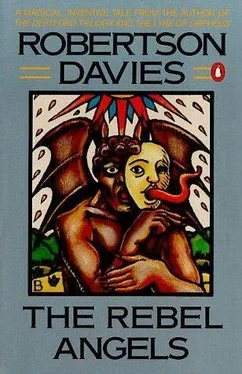Robertson Davies - The Rebel Angels
Здесь есть возможность читать онлайн «Robertson Davies - The Rebel Angels» весь текст электронной книги совершенно бесплатно (целиком полную версию без сокращений). В некоторых случаях можно слушать аудио, скачать через торрент в формате fb2 и присутствует краткое содержание. Жанр: Триллер, на английском языке. Описание произведения, (предисловие) а так же отзывы посетителей доступны на портале библиотеки ЛибКат.
- Название:The Rebel Angels
- Автор:
- Жанр:
- Год:неизвестен
- ISBN:нет данных
- Рейтинг книги:5 / 5. Голосов: 1
-
Избранное:Добавить в избранное
- Отзывы:
-
Ваша оценка:
- 100
- 1
- 2
- 3
- 4
- 5
The Rebel Angels: краткое содержание, описание и аннотация
Предлагаем к чтению аннотацию, описание, краткое содержание или предисловие (зависит от того, что написал сам автор книги «The Rebel Angels»). Если вы не нашли необходимую информацию о книге — напишите в комментариях, мы постараемся отыскать её.
The Rebel Angels — читать онлайн бесплатно полную книгу (весь текст) целиком
Ниже представлен текст книги, разбитый по страницам. Система сохранения места последней прочитанной страницы, позволяет с удобством читать онлайн бесплатно книгу «The Rebel Angels», без необходимости каждый раз заново искать на чём Вы остановились. Поставьте закладку, и сможете в любой момент перейти на страницу, на которой закончили чтение.
Интервал:
Закладка:
Ozy Froats, and dozy doats
And little Lambsie divy -
and if he was injured in the game the cheerleaders, led by his own sweetheart, Peppy Peggy, brought him to his feet with the long, yearning cry, "Come o-o-o-o-n Ozy! Come O-O-O-O-N OZY!" But everybody knew that Ozy was a star in biology, as well as football, and a Very Big Man On Campus. What he had been doing since graduation, and a Rhodes Scholarship, only God and biologists knew, but the President had named him as another Ornament to the University. So I was glad he had not wholly forgotten me.
"Murray Brown is giving you a rough time, Ozy."
"Yes. You saw that there was a parade outside the Legislature yesterday. People wanting education grants cut. Some of the signs read, "Get the Shit Out of Our Varsity". That meant me. I'm Murray's great peeve."
"Well, do you actually work with -?"
"Sure I do. And a very good thing, too. Time somebody got to grips with it. – God, people are so stupid."
"They don't understand, and they're overtaxed and scared about inflation. The universities are always an easy mark. Cut the frills away from education. Teach students a trade so they can make a living. You can't persuade most of the public that education and making a living aren't the same thing. And when the public sees people happily doing what they like best and getting paid for it, they are envious, and want to put a stop to it. Fire the unprofitable professors. Education and religion are two subjects on which everybody considers himself an expert; everybody does what he calls using his common sense. – I suppose your work costs a lot of money?"
"Not as much as lots of things, but quite a bit. It isn't public money, most of it. I get grants from foundations, and the National Research Council, and so forth, but the University backs me, and pays me, and I suppose I'm a natural scapegoat for people like Brown."
"Your work is offensive because of what you work with. Though I should think it was cheap."
"Oh no, not at all. I'm not a night-soil man, Simon. The stuff has to be special, and it costs three dollars a bucket, and if you multiply that by a hundred to a hundred and twenty-five – and that's the smallest test-group I can use – it's three hundred dollars or more a day, seven days a week, just for starters."
"A hundred buckets a day! Quite a heap."
"If I was in cancer research you wouldn't hear a word said. Cancer's all the rage, you know, and has been for years. You can get any money for it."
"I don't suppose you could say this was related to cancer research?"
"Simon! And you a parson! That'd be a lie! I don't know what it's related to. That's what I'm trying to find out."
"Pure science?"
"Nearly. Of course I have an idea or two, but I'm working from the known towards the unknown. I'm in a neglected field and an unpopular one because nobody really likes messing with the stuff. But sooner or later somebody had to, and it turns out to be me. I suppose you want to hear about it?"
"I'd be delighted. But I didn't come to pry, you know. Just a friendly visit."
"I'm glad to tell you all I can. But will you wait a few minutes; there's somebody else coming – a girl Hollier wants to know about my work, because of something she's doing in his line, whatever that is. Anyway, she should be here soon."
Shortly she appeared, and it was my New Testament Greek student and the thorn in the flesh of Professor Hollier, that unexpected puritan: Miss Theotoky. A queer group we made: I was in my clerical clothes and back-to-front collar, because I had been at a committee dinner where it seemed appropriate, and Maria was looking like the Magdalen in a medieval illumination, though not so gloomy, and Ozias Froats looked like what was left of a great footballer who had been transformed into a controversial research scientist. He was still a giant and still very strong, but his hair was leaving him, and he had what seemed to be a melon concealed in the front of his trousers, when his white lab-coat revealed it. There were pleasantries, and then Ozy got down to his explanation.
"People have always been interested in their faeces; primitive people take a look after they've had a motion, to see if it tells them anything, and there are more civilized people who do that than you'd suppose. Usually they are frightened; they've heard that cancer can give you blood in your stools, and you'd be amazed how many of them rush off to the doctor in a sweat when they've forgotten the Harvard beets they ate the day before. In the old days doctors looked at the stuff, just the way they looked at urine. They couldn't cut into anybody, but they made quite a lot of those examinations."
"Scatomancy, they called it," said Maria. "Could they have learned anything?"
"Not much," said Ozy; "though if you know what you are doing you can find out a few things by smell – the faeces of a drug-addict, for instance, are easy to identify. Of course when real investigative science got going they did some work on faeces – you know, measured the amounts of nitrogen and ether extract and neutral fat and cholalic acid, and all the inspissated mucus and bile and bacteria, and the large amounts of dead bacteria. The quantity of food residue is quite small. That work was useful in a restricted area as a diagnostic process, but nobody carried it very far. What really got me going on it was Osier.
"Osier was always throwing off wonderful ideas and insights that he didn't follow up; I suppose he expected other people would deal with them when they got around to it. As a student I was caught by his brief remarks on what was then called catarrhal enteritis; he mentioned changes in the constitution of the intestinal secretion – said, "We know too little about the succus entericus to be able to speak of influences induced by change in its quantity or quality." He wrote that in 1896. But he proposed some associations between diarrhoea and cancer, and anaemia, and some kidney ailments, and what he said stuck in my mind.
"It wasn't till about ten years ago that I came on a book that brought back what Osier had said, though the application was radically different. It was a proposal for what the author named Constitutional Psychology – a man called W. H. Sheldon, a respected Harvard scientist. Roughly, what he said was that there was a fundamental connection between physique and temperament. Not a new idea, of course."
"Renaissance writing is full of it," said Maria.
"You wouldn't call it scientific, though. You wouldn't be able to go that far."
"It was pretty good," said Maria. "Paracelsus said that there were more than a hundred, and probably more than a thousand, kinds of stomach, so that if you collected a thousand people it would be as foolish to say they were alike in body, and treat them as if they were alike in body, as it would be to suppose they were identical in spirit. 'There are a hundred forms of health,' he said, 'and the man who can lift fifty pounds may be as able-bodied as a man who can lift three hundred pounds.' "
"He may have said it, but he couldn't prove it."
"He knew it by insight."
"Now, now, Miss Theotoky, that'll never do. You have to prove things like that experimentally."
"Did Sheldon prove what Paracelsus said experimentally?"
"He certainly did!"
"That just proves Paracelsus was the greater man; he didn't have to fag away in a lab to get the right answer."
"We don't know if Sheldon got the completely right answer; we don't have any answers yet – just careful findings. Now -"
"She's teasing you, Ozy," I said. "Maria, you be quiet and let the great man talk. Perhaps we'll give Paracelsus an innings later. You know, of course, that Professor Froats is under great criticism at present, of a kind that could be harmful."
Читать дальшеИнтервал:
Закладка:
Похожие книги на «The Rebel Angels»
Представляем Вашему вниманию похожие книги на «The Rebel Angels» списком для выбора. Мы отобрали схожую по названию и смыслу литературу в надежде предоставить читателям больше вариантов отыскать новые, интересные, ещё непрочитанные произведения.
Обсуждение, отзывы о книге «The Rebel Angels» и просто собственные мнения читателей. Оставьте ваши комментарии, напишите, что Вы думаете о произведении, его смысле или главных героях. Укажите что конкретно понравилось, а что нет, и почему Вы так считаете.












